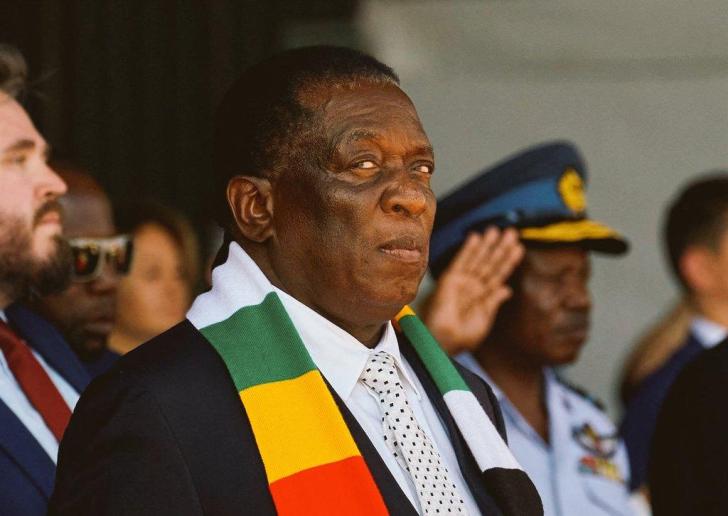News / National
Mnangagwa threatens errant Ministers
18 hrs ago | Views

President Emmerson Mnangagwa has issued a stern warning to cabinet ministers and senior officials, vowing "dire consequences" for those who fail to attend meetings or neglect their duties in 2025. The president made the remarks during his closing speech at the final cabinet meeting of the year at State House in Harare.
Mnangagwa expressed concern over a growing trend of ministers and senior officials being absent from cabinet meetings, which he described as detrimental to the smooth functioning of the government. He emphasized that the effectiveness of cabinet processes relies on the timely submission of vital documents and regular participation in meetings, including both ad-hoc and standing cabinet committees.
"Let me, however, hasten to emphasise that cabinet processes are anchored on the timely submission of vital documents and regular attendance by ministers and officials," Mnangagwa said. "The worrisome tendency by ministers and senior officials to absent themselves from meetings is untenable."
He also criticized the practice of delegating junior officials to attend meetings in place of ministers, calling it "gross dereliction of duty." Mnangagwa directed that only directors and above should represent ministers in working party meetings in their absence.
"Permanent secretaries should ensure that in their absence, only directors and above should attend working party meetings," he added.
Looking ahead to 2025, Mnangagwa announced that the Chief Secretary to the President and Cabinet would be tasked with closely monitoring attendance and ensuring that ministers and officials comply with the requirements. Those who fail to meet expectations could face severe repercussions.
"In the 2025 calendar year, the Chief Secretary is directly to strictly monitor individual attendance and ensure that errant ministers and officials toe the line or risk dire consequences," Mnangagwa said. "Ministers should remain mindful that cabinet business takes precedence over all other business."
In an effort to address the issue of absenteeism, Mnangagwa also made it clear that he would no longer tolerate "bench warmers" in cabinet processes. He stressed that deputy ministers, when assigned to attend meetings, must be adequately prepared and empowered to contribute meaningfully to discussions.
"In cases where deputy ministers are assigned, they should be adequately capacitated to enable active participation in the requisite deliberations," the president noted. "To this end, I direct that in the 2025 programme cycle and going forward, deputy Ministers must now sign performance contracts."
Mnangagwa concluded by stressing the importance of ministers ensuring their deputies are well-briefed on government business and empowered to take an active role in decision-making. The president's comments indicate a renewed focus on accountability and active participation within the cabinet in the year ahead.
Mnangagwa expressed concern over a growing trend of ministers and senior officials being absent from cabinet meetings, which he described as detrimental to the smooth functioning of the government. He emphasized that the effectiveness of cabinet processes relies on the timely submission of vital documents and regular participation in meetings, including both ad-hoc and standing cabinet committees.
"Let me, however, hasten to emphasise that cabinet processes are anchored on the timely submission of vital documents and regular attendance by ministers and officials," Mnangagwa said. "The worrisome tendency by ministers and senior officials to absent themselves from meetings is untenable."
He also criticized the practice of delegating junior officials to attend meetings in place of ministers, calling it "gross dereliction of duty." Mnangagwa directed that only directors and above should represent ministers in working party meetings in their absence.
"Permanent secretaries should ensure that in their absence, only directors and above should attend working party meetings," he added.
"In the 2025 calendar year, the Chief Secretary is directly to strictly monitor individual attendance and ensure that errant ministers and officials toe the line or risk dire consequences," Mnangagwa said. "Ministers should remain mindful that cabinet business takes precedence over all other business."
In an effort to address the issue of absenteeism, Mnangagwa also made it clear that he would no longer tolerate "bench warmers" in cabinet processes. He stressed that deputy ministers, when assigned to attend meetings, must be adequately prepared and empowered to contribute meaningfully to discussions.
"In cases where deputy ministers are assigned, they should be adequately capacitated to enable active participation in the requisite deliberations," the president noted. "To this end, I direct that in the 2025 programme cycle and going forward, deputy Ministers must now sign performance contracts."
Mnangagwa concluded by stressing the importance of ministers ensuring their deputies are well-briefed on government business and empowered to take an active role in decision-making. The president's comments indicate a renewed focus on accountability and active participation within the cabinet in the year ahead.
Source - online























